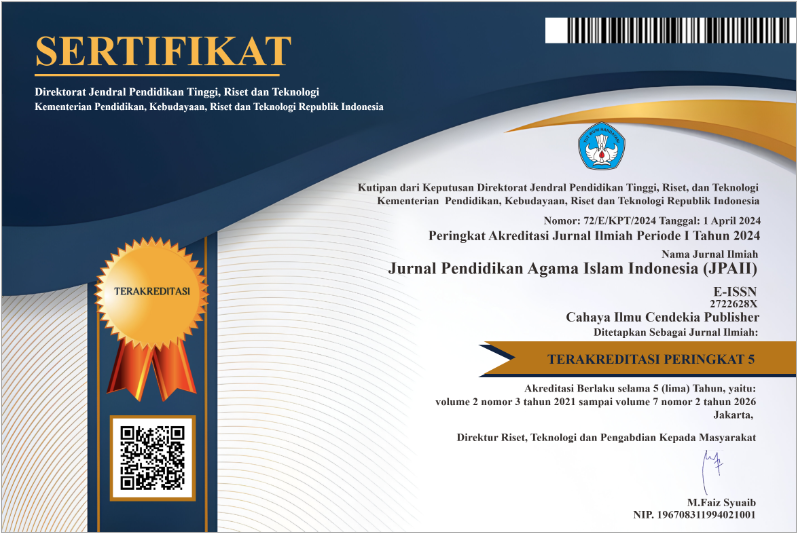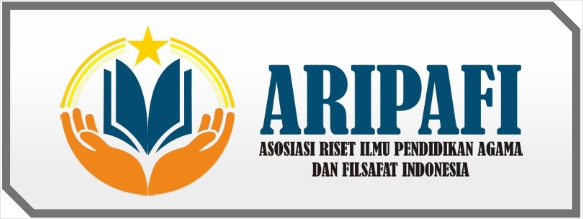The Impact of the Imtaq Program Activities on the Development of Students' Spiritual Potential at State High School 1 Pajar Bulan
Abstract
Purpose of the study: The goal of this research is to determine the effect of the Imtaq program activities on the development of students' spiritual potential at State High School 1 Pajar Bulan. It also aims to identify the supporting and inhibiting factors.
Methodology: The research methodology used is a type of research (field research) with a quantitative approach. The population in this study consists of 243 people and the sample is 60 people, using stratified random sampling technique. Data collection was conducted through observation, questionnaires, interviews, and documentation. The data were analyzed using simple linear regression testing.
Main Findings: A significance value of 0.000 was obtained, which is smaller than 0.05 (0.000<0.05), indicating that Ha is accepted and Ho is rejected, meaning that the Imtaq program has a positive and significant influence on the development of the spiritual potential of students at State High School 1 Pajar Bulan. The contribution of the Imtaq program to the development of spiritual potential in this study is 95.6%, while 4.4% is influenced by other factors. The Imtaq program is supported by all teachers and staff as well as adequate facilities, while the inhibiting factors are the lack of motivation and role modeling from parents at home as well as the students' low ability to read the Qur'an.
Novelty/Originality of this study: It emphasizes the in-depth aspects of students' character, including religious principles, direction in life, identity, and noble ethics. Furthermore, it not only focuses on the outcomes or implications but also provides space to assess the form and quality of IMTAQ activities implemented in educational institutions. This makes the study significant for other public schools as a step to strengthen character education based on spiritual values.
References
M. Dhori and T. Nurhayati, “Implementasi Pendidikan Karakter Religius Di Sekolah Dasar,” eL Bidayah J. Islam. Elem. Educ., vol. 4, no. 1, pp. 1–12, 2022, doi: 10.33367/jiee.v4i1.1966.
L. Azzahra and I. Dodi, “Pentingnya Mengenalkan Alqur’an Sejak Dini Melalui Pendidikan Agama Islam,” J. Pendidik. Indones., vol. 1, no. 1, pp. 13–20, 2023.
Y. Syafrin, M. Kamal, A. Arifmiboy, and A. Husni, “Pelaksanaan Pembelajaran Pendidikan Agama Islam,” Educ. J. Pendidik., vol. 2, no. 1, pp. 72–77, 2023, doi: 10.56248/educativo.v2i1.111.
A. Asyari, M. Suhendra, and M. A. Rasidi, “Efektivitas Program Imtaq Dalam Membentuk Kepribadian Siswa Di SMPN 1 Pujut,” JISIP (Jurnal Ilmu Sos. dan Pendidikan), vol. 5, no. 4, pp. 1426–1434, 2021, doi: 10.58258/jisip.v5i4.2570.
Samsul Arifin, “Kecerdasan Spiritual (SQ) Sebagai Faktor Pendukung Hasil Belajar Siswa,” La-Tahzan J. Pendidik. Islam, vol. 12, no. 2, pp. 201–214, 2020, doi: 10.62490/latahzan.v12i2.103.
V. Anugrah, R. Mansur, and I. Musthofa, “Implementasi Program Imtaq dalam Pembentukan Karakter Religius Siswa di SMA Negeri 4 Malang,” VICRATINA J. Pendidik. Islam, vol. 8, no. 6, pp. 99–108, 2023.
R. Febriani, “Pengaruh Program Imtaq (Iman dan Takwa) Terhadap Karakter Religius Siswa di Madrasah Aliyah Madinatun Najah Rengat (Skripsi),” Universitas Islam Negeri Sultan Syarif Kasim Riau Pekanbaru, 2023.
Marqomah and A. S. Ichsan, “Pengembangan Kecerdasan Spiritual Siswa Perspektif Psikologi melalui Pembelajaran Fiqih Development of Students ’ Spiritual Intelligence from a Psychological Perspective through Fiqh Learning,” J. Elem. Educ. Res., vol. 3, no. 2, p. 9, 2023.
L. Mawaddah, “Implementasi Kegiatan IMTAQ Dalam Pembentukan Religiusitas Siswa (Skripsi),” Universitas Islam Negeri Mataram, 2023.
I. Subhi and Y. R. Anggraini, Buku Panduan Penulisan Skripsi. Pagar Alam: LPPM Institut Agama Islam Pagaralam, 2024.
Sugiyono, Metode Penelitian Kuantitatif Kualitatif dan R&D. Bandung: ALFABETA, cv, 2019.
E. Wulandari, H. Faturrohman, S. Tri Widodo, N. Indah Wahyuni, and F. Ningsih, “Pengaruh Penggunaan Media Interaktif Terhadap Motivasi Belajar Peserta Didik Mata Pelajaran Pendidikan Pancasila Kelas Ii Sdit Insan Mulia Semarang,” Didakt. J. Ilm. PGSD STKIP Subang, vol. 9, no. 5, pp. 1415–1424, 2023, doi: 10.36989/didaktik.v9i5.2086.
S. Arikunto, Prosedur Penelitian: Suatu Pendekatan Praktik. Jakarta: Rineka Cipta, 2017.
I. Supriadi, R. Abadi, and R. Maghfiroh Ulfa, Statistika Ekonomi dan Bisnis. Yogyakarta: Jejak Pustaka, 2023.
Y. Tojiri, H. S. Putra, and N. Faliza, Dasar Metodologi Penelitian: Teori, Desain dan Analisis Data. Padang: Takaza Innovatix Labs, 2023.
A. G. Prawiyogi, T. L. Sadiah, A. Purwanugraha, and P. N. Elisa, “Penggunaan Media Big Book untuk Menumbuhkan Minat Membaca di Sekolah Dasar,” J. Basicedu, vol. 5, no. 1, pp. 446–452, 2021, doi: 10.31004/basicedu.v5i1.787.
D. Taluke, R. S. M. Lakat, A. Sembel, E. Mangrove, and M. Bahwa, “Analisis Preferensi Masyarakat Dalam Pengelolaan Ekosistem Mangrove Di Pesisir Pantai Kecamatan Loloda Kabupaten Halmahera Barat,” Spasial, vol. 6, no. 2, pp. 531–540, 2019.
J. Hartono, Metode Pengumpulan dan Teknik Analisa Data. Yogyakarta: ANDI, 2018.
H. Kurniawan et al., Buku Ajar Statistik Dasar. Jambi: PT. SonpedianPublishing Indonesia, 2024.
Z. Matondang and H. F. Nasution, Praktik Analisis Data Pengolaan Ekonometrika Dengan Eviews & SPSS. Medan: CV. Merdeka Kreasi Group, 2021.
D. Priyanto, Olah Daa Sendiri Analisis Regresi Linier dengan SPSS dan Analisis Regresi Panel Eviews. Yogyakarta: CV. Cahaya Harapan, 2022.
B. Ruhaya, Baharuddin, and Muhammad Lutfi, “Peranan Program Tadarus Al-Qur’an Dalam Menanamkan Minat Baca Al-Qur’an Peserta Didik Di Man 1 Polewali Mandar,” Inspiratif Pendidik., vol. 12, no. 2, pp. 597–618, 2023, doi: 10.24252/ip.v12i2.43793.
U. Latif, “Dzikir Dan Upaya Pemenuhan Mental-Spiritual Dalam Perspektif Al-Qur’an,” At-Taujih Bimbing. dan Konseling Islam, vol. 5, no. 1, p. 28, 2022, doi: 10.22373/taujih.v5i1.13729.
N. Najma and N. A. A. Putri, “Menganalisis Pengaruh Shalawat Terhadap Ketenangan Jiwa: Pendekatan Psikologis dan Spiritual,” Psycho Aksara J. Psikol., vol. 2, no. 2, pp. 141–148, 2024.
P. A. Wirawan, R. D. Alghazali, and A. Anrial, “Penguatan Mental Mahasantri Al-Jamiah IAIN Curup Melalui Kuliah Tujuh Menit,” J. Da’wah, vol. 2, no. 2, pp. 275–295, 2023, doi: 10.32939/jd.v2i2.3155.
F. Firdaus, A. Hamzah, and S. Ni’mah, “Doa Dalam Al-Qur’an,” J. Al-Mubarak J. Kaji. Al-Qur’an dan Tafsir, vol. 8, no. 1, pp. 1–15, 2023, doi: 10.47435/al-mubarak.v8i1.2109.
D. A. Enghariano, “Konsep Infak Dalam Al-Qur’an” J. Al-Maqasid J. Ilmu-Ilmu Kesyariahan dan Keperdataan, vol. volume 6, no. 1, p. 101, 2020.
D. Pangesti, “Pengembangan Kecerdasan Spirituan di MTs Ma’arif NU 1 Cilongok Kabupaten Banyumas (Skripsi),” Universitas Islam Negeri Prof. K.H. Saifuddin Zuhri, 2023.
K. Kamariyah, J. Jumarim, A. Sulhan, and H. D. Aulia, “Pendidikan Karakter Peserta Didik Melalui Program Imtaq,” J. Ilm. Profesi Pendidik., vol. 9, no. 2, pp. 914–918, 2024, doi: 10.29303/jipp.v9i2.2222.
C. Ramot, “Mengenal Spiritual Quotient (SQ) atau Kecerdasan Spiritual dan Cara Meningkatkannya,” Klik Dokter. Accessed: Jun. 23, 2025.
Copyright (c) 2025 Wulan Sari, Fita Sarpika

This work is licensed under a Creative Commons Attribution 4.0 International License.
Authors who publish with this journal agree to the following terms:
- Authors retain copyright and acknowledge that the Jurnal Pendidikan Agama Islam Indonesia (JPAII) is the first publisher licensed under a Creative Commons Attribution 4.0 International License.
- Authors are able to enter into separate, additional contractual arrangements for the non-exclusive distribution of the journal's published version of the work (e.g., post it to an institutional repository or publish it in a book), with an acknowledgment of its initial publication in this journal.
- Authors are permitted and encouraged to post their work online (e.g., in institutional repositories or on their website) prior to and during the submission process, as it can lead to productive exchanges and earlier and greater citation of published work.







.png)
.png)





















